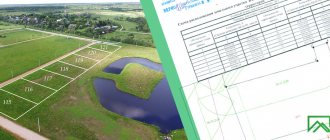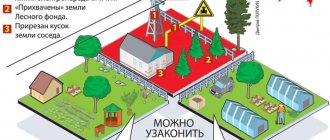Home / Real estate / Land / Ownership / Privatization
Back
Published: 06/21/2017
Reading time: 6 min
0
144
Millions of Russians dream of becoming land owners. There are several ways to do this.
There are two main options - buy land or privatize it. The fundamental difference between these methods is the amount of costs for acquiring land and the form of registration of documents for ownership.
- Privatization Law
- Cost of land privatization Amount of state duty
- Additional expenses
If you only have a garden book on hand
Since not all citizens carefully monitor real estate documentation, problems during re-registration arise very often. One of the pressing questions is how to privatize your dacha if you only have a garden book for it. For many potential property owners, this is the only land document they have in their hands.
In practice, this is not a basis for refusal of privatization, but in order to re-register a plot of land as private property, you will have to spend time going to government agencies to restore the required papers.
| Options | |
| The plot was issued in horticulture | Contact the district administration to register privatization based on the issued document on the perpetual use of real estate. There is no need to coordinate the process with the partnership or authorized management. |
| Land received individually | A simplified registration procedure in which you need to submit a complete package of documents to Rosreestr. |
A minimum package of documents is submitted, which consists of:
- Your personal passport;
- Applications for privatization;
- Extracts from the archives of a dacha or garden cooperative;
- Land plot plans.
If the archive does not contain the necessary papers, you can replace them with an extract from the local administration book. The application and documents will be accepted only after you pay the state fee of about two thousand rubles.
Privatization of a summer cottage: where to start
The first step towards formalizing the legal rights of summer residents to land will be to establish the fact: whether the user of the plot has the right to receive ownership of it as a free transfer from the state. This category of stakeholders includes:
- Citizens of Russia.
- Persons who have not previously used their right to obtain property of a similar category free of charge.
Privatization objects must also meet mandatory specific requirements:
- The plots were accepted by associations of summer residents or gardeners until the end of October 2001.
- The land being registered does not belong to the land withdrawn from circulation and there are no encumbrances in relation to this allotment.
The first stage of privatization of a garden plot can be considered a citizen’s appeal to the local government body (hereinafter referred to as LGU). The applicant must receive a certificate, protocol extract, or a decision on the provision of land confirming the assignment of a specific plot to him.
The land user also needs to obtain and fill out a sample application for the provision of a plot. This can be done by visiting the administration in person, or downloaded from the compulsory medical insurance website.
The final step in collecting documents will be drawing up a layout plan for the plot of land that the summer resident is interested in obtaining. Such a document is drawn up by companies that have surveyors and the necessary equipment on their staff.
Important! There is no need to draw up a diagram if there is an approved land surveying project, or the State Property Committee already contains a description of the location of the land boundaries.
How much is the state duty for privatization in 2020
Despite the fact that privatization is a free procedure, you will still have to pay to register the contract.
The state duty for a document increases every year and for 2020 is:
- 1,000 rub . for an individual;
- 15,000 rub . for a legal entity.
And this is not all the payments that will have to be made for the procedure.
Extracts from the Unified State Register and cadastral passport are also paid.
Their price varies from 150 to 250 rubles , depending on where they are received.
Receipt and details
The receipt for payment of the state contribution is an important document that must be kept and attached to the package of main papers submitted for privatization.
Photo: sample receipt for payment of state duty
Which receipt will be official?
- having the address, first and last name of the payer;
- possessing a TIN and other details of the service that registers the agreement;
- it must indicate the amount of the payment made;
- The document must contain the date and signature of the citizen.
But where can I find out the details of the public service to which I need to make a contribution?
Usually, employees of the privatization department or the MFC provide the citizen with a blank receipt, where all the data is already written down.
If the payer does not have time to visit offices, information can be obtained on the website of the Federal Tax Service of Russia.
Payment Methods
There are several ways to pay the state fee for privatization of an apartment. The most reliable of them:
- visit any branch of Sberbank of Russia;
- pay using the State Services information portal;
- transfer money on the Federal Tax Service website.
If we are talking about payment via the Internet, you must print the final receipt yourself.
It will definitely be needed when concluding a contract.
List of documents
Most of the costs are incurred on documents: certificates, extracts, cadastral passports, etc. Applicants will have to prepare title papers.
What documents are needed for land privatization:
- act of a government body on the transfer of a site for use by citizens;
- a copy of the lease agreement;
- certificate of inheritance of land;
- cadastral passport (from January 1, 2020 - extract from the Unified State Register of Real Estate);
- consent of other family members/house owners.
A small list of documents should not be misleading. Registrars may ask for additional information. Therefore, it is advisable to find out in advance what documents will be required in your case.
.
The most convenient way is to consult with a lawyer on our portal
. Moreover, the consultation is free and does not oblige you to anything.
Privatization and how it is carried out
The word “privatization” in Russia has a distinctly negative connotation. These are echoes of the 90s of the last century, when plants and factories became the property of a small handful of people for next to nothing. Privatization in the legal sense of the word is the process of transferring state property into the ownership of citizens or organizations, that is, into private ownership.
Such transfer can be carried out either for a fee or free of charge. Alienation of state-owned land property, as a rule, is carried out on a reimbursable basis, because the state must also replenish the budget from the disposal of real estate belonging to it.
At the same time, the law also names some cases when alienation can be carried out without charging such a fee.
These cases can be roughly divided into the following categories:
- Privatization of land plots that were provided to citizens in the period before October 29, 2001;
- Privatization of land plots on other grounds that are provided for by the Land Code of the Russian Federation (hereinafter also referred to as the “Land Code of the Russian Federation”).
All other cases of acquisition of land plots into private ownership, which are not designated in the laws as free of charge, are carried out with payment to the state of a certain “price” for the transferred land plots.
Free privatization is possible only in cases provided for by law; in all other cases it is carried out on a paid basis.
Privatization without charging a fee is understood as a form of acquisition of private property, the cost of registration of which does not exceed the so-called technical expenses (state duty, land surveying, paperwork) - in this case, there is no need to buy the land from the state.
Privatization of plots provided before October 29, 2001
Over time, the way land is made available to the population may change. If previously the state could transfer land into the possession of citizens under the same conditions, then such conditions changed and new ones replaced them.
Previously, land plots for the possession of the population were provided in the form of:
- permanent (unlimited) use;
- lifelong inheritable ownership.
These land uses were widespread, with tens of millions of people owning land on these grounds.
Such land plots could be used for gardening, so beloved by the population of Russia, as well as for erecting buildings on this land, but, of course, they were not the property of citizens. In the Soviet Union, as is known, there was only one form of ownership - everything belonged to the state, and the state provided land for the ownership of citizens. This is where the practice began, which lasted until 2001, when individuals became only owners and users of land. They could receive land for free use, but, naturally, they could not dispose of the land. Disposal is the exclusive prerogative of the owner, and the owner is the state.
But these times have already passed, and the legal conditions have changed. After the entry into force of the Land Code of the Russian Federation, such forms of provision of land rights that existed previously went into oblivion. This opportunity is no longer available to citizens; it remains only for government agencies. The latter have a special status, which allows them to receive great privileges - institutions perform important social state tasks.
Everything flows, everything changes. The methods of providing rent have also changed. Now citizens who want to obtain any piece of land can rent it from the state or buy it as private property.
But with all this, those citizens who received land plots on the two above-mentioned grounds before the entry into force of the RF Land Code can take advantage of the preferential procedure for privatizing such land plots.
In other words, if a citizen has a certain land plot that he received from the state before the date of entry into force of the RF Land Code, i.e. before October 29, 2001, he can exercise the right to transfer it into private ownership free of charge.
According to regulatory requirements, if the loan was provided before October 29, 2001 for:
- running private household plots or dachas;
- cultivating vegetable gardens or orchards;
- individual housing construction or construction of garages,
then the persons who own these land plots have the right to transfer these lands into private ownership, and completely free of charge.
Legal provisions establish the types of permissible use of memory. If the land is provided for purposes other than those listed above, the right to privatization free of charge will no longer be possible.
There are still many such citizens in Russia, although millions of people have already taken advantage of this right and acquired private property in the form of their own plot of land.
The privatization period is not burdened with any restrictions - privatization can be carried out at any time.
Which areas cannot be privatized
According to paragraph 8 of Article 28 of Federal Law-178 “On Privatization...” the alienation of land plots is prohibited if the land:
- withdrawn from use (contaminated with dangerous chemicals or subjected to technogenic (biogenic) contamination;
- has strategic importance, belongs to nature reserves (parks);
- reserved for government needs;
- refers to forest or water resources;
- is a square, street, passage, highway, embankment, etc.
However, refusal to use certain categories of land, the alienation of which is unacceptable by law, is not acceptable. Such a restriction on the use of land is only restrictive in nature (for example, it is prohibited to engage in some specific type of activity on such lands).
How to privatize a land plot? The procedure itself, in addition to collecting a large package, is not something impossible. It is enough just to follow a certain order of registration.
What documents need to be collected to register such land as ownership?
Considering that this is a simplified procedure, a large heap of documents is not required, among the required documentation is the following:
- Cadastral passport for land plot.
- A document that confirms the basis of ownership of the site.
- Applicant's passport.
- Receipt for payment of state duty (currently it is 350 rubles).
If with documents under paragraphs. 3) and 4) everything should be extremely clear, but with the first two it’s already more difficult.
A cadastral passport for the land plot, confirming the existence of such a plot in the real estate cadastre, must be required, otherwise privatization will be refused. If the plot has already been registered with the cadastral register, then great, but if not, then you will also have to carry out land surveying and registration. Despite the fact that privatization is free, technical costs are still borne by the acquirer.
The services of cadastral engineers are not cheap, but there are many offers on the market now, you can find an acceptable option.
As for documents that can confirm the legality of ownership of a land plot, these can be some permitting documents:
- act on the provision of land plots for use by an individual;
- certificate of provision of land plot;
- extract from the household register (issued by the local administration);
- another document that can confirm the fact that a person legally possesses this property.
If you do not have such documents on hand, then you need to apply for them to the local administration for their issuance.
Before the start of land surveying, these documents, which will confirm the legality of your claims regarding the site, will also need to be provided to the cadastral engineer.
After all the documents have been collected and the state duty has been paid, you must contact Rosreestr in order to register your right to the privatized plot.
So, what is the cost of registering ownership of a land plot in this case? Unconditional expenses – 350 rubles state duty. Additional costs will also include the cost of a cadastral engineer if the site has not been registered with the cadastral register.
In all other respects, the privatization process is free. But the state, by giving land to citizens for free, will still not miss out on its “piece of the pie.” By becoming the owner of a land plot, a person acquires the obligation to pay land tax, which will need to be paid annually.
After privatization, the obligation to pay land tax annually arises.
But the owner also receives a lot of rights - now he has complete “carte blanche” in relation to the land plot in his hands - he can own it, use it, and dispose of it, and also be completely confident that no one will take away this land.
Other possible cases of free privatization of land
The Land Code of the Russian Federation provides several more opportunities for free privatization of land plots.
These lucky people include the following categories of people:
- Citizens who work in a municipality are employed in certain professions (and who received a salary under the conditions specified in the Land Code of the Russian Federation).
- Citizens who have three or more children.
- Other citizens determined in accordance with national or local legislation.
- Citizens who purchase land plots in the Far East (this was a political decision to provide land in such a remote corner of the country in order to increase the population’s interest in it).
For Far Eastern residents there is a separate procedure, but for the first three more common cases, the privatization procedure will consist of a number of successive stages:
- The first step is to prepare the documents that will be required for privatization. Depending on the basis on which the storage unit is privatized, the set of documents may differ. A complete list of all required documents is contained in a special by-law - Order of the Ministry of Economy of the Russian Federation dated January 12, 2015 No. 1.
- Submit the prepared documents to the authorized body - the local municipality or the Federal Property Management Agency (depending on who owns the land plot planned for privatization). You can find out the owner in Rosreestr by ordering the appropriate extract. If the owner is a municipal entity, then you need to contact them; if the land is federal, then there is a direct route to the regional branch of the Federal Property Management Agency - it is this body that manages federal property. The authorized bodies will review the received documents within 30 days and, based on the results, will decide on their consent to privatization or on giving a negative answer. If a refusal is received, then perhaps some documents were not submitted, or the conditions established by law were not met. But the answer will be given in any case.
- If a positive decision from the authorized body has been received, then further action must be taken depending on the specific situation. So, if a plot of land is already registered in the cadastral register, then you can immediately proceed directly to submitting documents to Rosreestr. If the plot is not registered, then before registering ownership rights to it, it is necessary to carry out land surveying and registration. Such work must be carried out by a cadastral engineer, with whom it is necessary to conclude an appropriate contract for the provision of paid services.
- When the cadastral engineer has completed all the necessary work, you can contact Rosreestr to register the right.
There is no need to collect documents that were previously collected for submission to the authorized body; it will be enough to attach the following set of documents:
- applicant's passport;
- decision of the authorized body on permission for privatization;
- document confirming payment of the state duty.
After registration of the right, the citizen becomes the full owner of the land plot.
How much does it cost to register ownership of a plot of land in the case described above? Considering that this privatization is free, there is no need to pay for the plot itself. But you will have to fork out for the state fee, the amount of which, depending on the basis for privatization, will vary from 350 to 2,000 rubles.
In addition, you will also have to spend money on paying for the services of a cadastral engineer. There will be no other expenses when registering ownership of a land plot in the indicated cases.
Free privatization is allowed only in cases expressly specified by law. If privatization does not fall under preferential categories, then it will be paid.
Considering that the considered cases of acquiring land plots are also preferential, the land itself is not purchased, but becomes property free of charge. At the same time, the obligation to pay land tax arises, as already mentioned above. Privatization costs in this case are purely “applied”.
Paid privatization of the site
If no benefits are provided by the laws of the federal level or constituent entities, then privatization of land must be carried out on a general, paid basis.
At its core, paid privatization is not much different from an ordinary civil transaction for the acquisition of something. Moreover, in order to carry out this type of privatization, the procedure and redemption price will depend on a number of conditions. So, what are the grounds for purchasing a plot?
Costs of land privatization
Let's consider the total costs that will have to be incurred when privatizing land:
| Cost type | Amount of expenses (RUB) | Peculiarities |
| State duty for registration of property rights | 350-2000 | You must always pay it, regardless of the type of land acquisition. |
| BTI technical passport | 1200-2500 | Costs may vary in different regions. Required only for privatization of land under a private house. |
| Refusal to participate in privatization | 200-1000 | It is required if the land has several users and some of them do not want to receive their share and participate in privatization. |
| Payment of contributions | Individually | Relevant for land under a garage or in a dacha cooperative. |
| Land surveying | 11-15 thousand | Relevant only if land surveying has not been carried out previously. |
| Extract from the Unified State Register of Real Estate | From 300 | Needed in all cases. |
| Cadastral passport | From 2000 | Needed in all cases. |
| Registration of a power of attorney for a representative | 1000-2000 | Required only if privatization is carried out through a representative. |
The largest costs go to land surveying and the BTI registration certificate. And if land surveying could have already been carried out earlier (even if not by the current user of the land) and, as a result, it is not required at the moment, then the registration certificate is usually tied to a specific residential building. That is why it is almost always required, provided that there is such a structure on the site.
The costs of land privatization are usually not very significant, however, due to the fact that many land users do not know where exactly to go, as well as what and where to order, the procedure itself can take a long time. During a free consultation, our lawyers will clarify the main controversial issues, and they will also be able to act as representatives to clients, thereby significantly reducing the procedure time.
FREE CONSULTATIONS are available for you! If you want to solve exactly your problem, then
:
- describe your situation to a lawyer in an online chat;
- write a question in the form below;
- call Moscow and Moscow region
- call St. Petersburg and region
Save or share the link on social networks
Author of the article
Natalya Fomicheva
Website expert lawyer. 10 years of experience. Inheritance matters. Family disputes. Housing and land law.
Ask a question Author's rating
Articles written
513
- FREE for a lawyer!
Write your question, our lawyer will prepare an answer for FREE and call you back in 5 minutes.
By submitting data you agree to the Consent to PD processing, PD Processing Policy and User Agreement
Useful information on the topic
2
Allocation of land share from agricultural lands
A common form of ownership of agricultural land is joint, or shared...
4
Donation agreement for a share of a house and land
The process of donating a share of real estate is regulated by the Civil, Housing and Land Code...
4
Agreement for the sale and purchase of a share of a house and a share of land
The property purchased or sold may be a share of a house and land….
10
How to draw up a deed of gift for a share in a house
Having received a share of the house as an inheritance, through privatization, under an agreement...
How to sell a share in a house with land
The sale of part of a house and a plot of land in shared ownership is associated...
1
Privatization of land under an apartment building
You can privatize not only a separate residential building, apartment or land...





